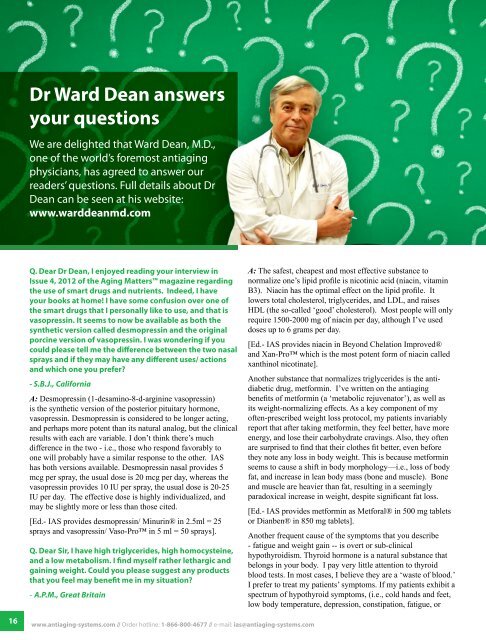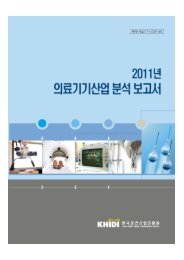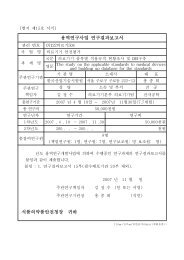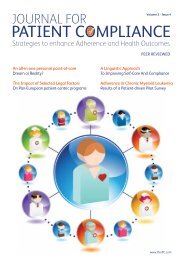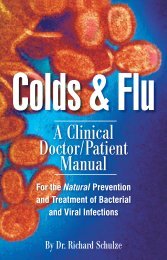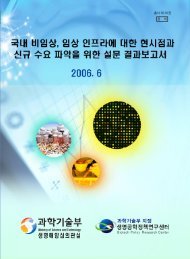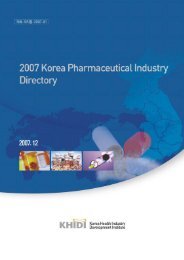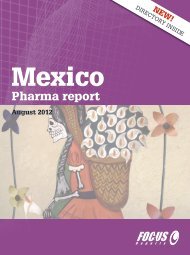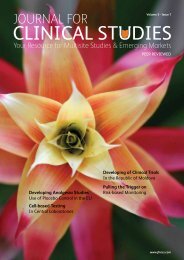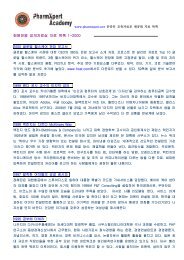Nanogen - PharmXpert Academy
Nanogen - PharmXpert Academy
Nanogen - PharmXpert Academy
You also want an ePaper? Increase the reach of your titles
YUMPU automatically turns print PDFs into web optimized ePapers that Google loves.
Dr Ward Dean answers<br />
your questions<br />
We are delighted that Ward Dean, M.D.,<br />
one of the world’s foremost antiaging<br />
physicians, has agreed to answer our<br />
readers’ questions. Full details about Dr<br />
Dean can be seen at his website:<br />
www.warddeanmd.com<br />
Q. Dear Dr Dean, I enjoyed reading your interview in<br />
Issue 4, 2012 of the Aging Matters magazine regarding<br />
the use of smart drugs and nutrients. Indeed, I have<br />
your books at home! I have some confusion over one of<br />
the smart drugs that I personally like to use, and that is<br />
vasopressin. It seems to now be available as both the<br />
synthetic version called desmopressin and the original<br />
porcine version of vasopressin. I was wondering if you<br />
could please tell me the difference between the two nasal<br />
sprays and if they may have any different uses/ actions<br />
and which one you prefer?<br />
- S.B.J., California<br />
A: Desmopressin (1-desamino-8-d-arginine vasopressin)<br />
is the synthetic version of the posterior pituitary hormone,<br />
vasopressin. Desmopressin is considered to be longer acting,<br />
and perhaps more potent than its natural analog, but the clinical<br />
results with each are variable. I don’t think there’s much<br />
difference in the two - i.e., those who respond favorably to<br />
one will probably have a similar response to the other. IAS<br />
has both versions available. Desmopressin nasal provides 5<br />
mcg per spray, the usual dose is 20 mcg per day, whereas the<br />
vasopressin provides 10 IU per spray, the usual dose is 20-25<br />
IU per day. The effective dose is highly individualized, and<br />
may be slightly more or less than those cited.<br />
[Ed.- IAS provides desmopressin/ Minurin® in 2.5ml = 25<br />
sprays and vasopressin/ Vaso-Pro in 5 ml = 50 sprays].<br />
Q. Dear Sir, I have high triglycerides, high homocysteine,<br />
and a low metabolism. I find myself rather lethargic and<br />
gaining weight. Could you please suggest any products<br />
that you feel may benefit me in my situation?<br />
- A.P.M., Great Britain<br />
A: The safest, cheapest and most effective substance to<br />
normalize one’s lipid profile is nicotinic acid (niacin, vitamin<br />
B3). Niacin has the optimal effect on the lipid profile. It<br />
lowers total cholesterol, triglycerides, and LDL, and raises<br />
HDL (the so-called ‘good’ cholesterol). Most people will only<br />
require 1500-2000 mg of niacin per day, although I’ve used<br />
doses up to 6 grams per day.<br />
[Ed.- IAS provides niacin in Beyond Chelation Improved®<br />
and Xan-Pro which is the most potent form of niacin called<br />
xanthinol nicotinate].<br />
Another substance that normalizes triglycerides is the antidiabetic<br />
drug, metformin. I’ve written on the antiaging<br />
benefits of metformin (a ‘metabolic rejuvenator’), as well as<br />
its weight-normalizing effects. As a key component of my<br />
often-prescribed weight loss protocol, my patients invariably<br />
report that after taking metformin, they feel better, have more<br />
energy, and lose their carbohydrate cravings. Also, they often<br />
are surprised to find that their clothes fit better, even before<br />
they note any loss in body weight. This is because metformin<br />
seems to cause a shift in body morphology—i.e., loss of body<br />
fat, and increase in lean body mass (bone and muscle). Bone<br />
and muscle are heavier than fat, resulting in a seemingly<br />
paradoxical increase in weight, despite significant fat loss.<br />
[Ed.- IAS provides metformin as Metforal® in 500 mg tablets<br />
or Dianben® in 850 mg tablets].<br />
Another frequent cause of the symptoms that you describe<br />
- fatigue and weight gain -- is overt or sub-clinical<br />
hypothyroidism. Thyroid hormone is a natural substance that<br />
belongs in your body. I pay very little attention to thyroid<br />
blood tests. In most cases, I believe they are a ‘waste of blood.’<br />
I prefer to treat my patients’ symptoms. If my patients exhibit a<br />
spectrum of hypothyroid symptoms, (i.e., cold hands and feet,<br />
low body temperature, depression, constipation, fatigue, or<br />
16<br />
www.antiaging-systems.com // Order hotline: 1-866-800-4677 // e-mail: ias@antiaging-systems.com


